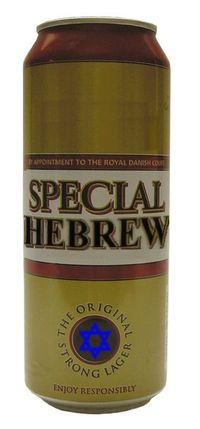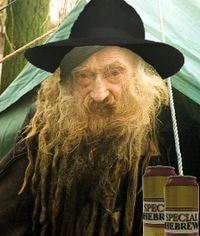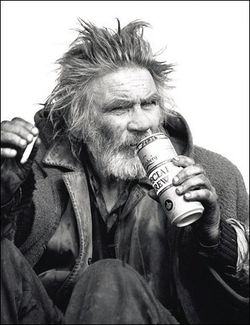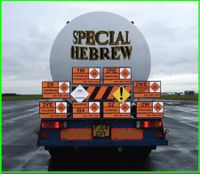Special Hebrew

| |
| Type | Lager/truck fuel |
|---|---|
| Alcohol by volume | 15% |
| Manufacturer | Crapsberg Brewery of Burton-on-Trent |
| Country of origin | United Kingdom |
| Introduced | 1991 |
| Colour | Brownish yellow |
| Ingredients | Methanol, diesel, benzene, sugar, other stuff |
| Warning | Harmful to the environment. Not kosher for Passover/fit for human consumption. Corrosive. |
“טעם של שתן”
– Rabbi Cohen
As recession hit the financial world hard in the early 1990s, people around the globe began to use their income more wisely by spending money on items deemed essential and by avoiding luxury expenses such as holidays, new cars and designer label clothing. As time went by with no prospect of economic upturn, even sales of alcoholic beverages - a product which, in times of hardship past, had tended to remain relatively unaffected - noticeably dropped creating severe worries amongst producers and company shareholders concerning profits.
In response, brewers and distillers looked closely at the British drinks and pubs trade in an effort to identify particular demographic groups with the intention of producing speciality drinks that could be aimed directly at closely-defined niche markets in the hope that by doing so they would, if not increase profitability, at least halt their gradual corporate decline and thus find themselves able to weather the financial storm. Alcoholic fruit-based drinks, sometimes known as alcopops, were introduced to appeal to younger drinkers - likewise, harder spirits such as vodka and schnapps, high in alcohol but low in calories, were aggressively marketed at women and people concerned with maintaining slim figures.
In 1990, Crapsberg Brewery Inc. of Burton on Trent - producers of several well-known lagers and bitters, identified a previously untargeted niche when researchers noticed a particular group in society: shambling, often elderly men with unkempt beards who muttered to themselves in an incomprehensible language - ie; rabbis. After several months of research and trials, Special Hebrew Super Strength Lager was introduced with this market in mind and went on sale early in 1991.
Crapsberg Brewery - Company History[edit | edit source]
Crapsberg Inc. was formed in the early 1890s and originally specialised in the production of industrial solvents, with the company becoming highly profitable just after the turn of the century when their Burton laboratory developed a revolutionary new cleaning agent that simplified the removal of burnt-on tarmac from the underside of steam engine boilers[1], previously a labour-intensive (and thus costly) task. Several other products were introduced and by 1910 the business had grown to become the largest in the Midlands with 15,000 employees.
In 1918, new regulations governing company practice with regard to health and safety in the workplace were brought in by Parliament. Item 45(b) of the new legal Act[2] made it mandatory for heavy industry and engineering firms to carry out periodic checks to ensure that employees were not under the effect of intoxicating substances while operating any form of machinery after studies had shown this to be one of the leading causes of workplace injuries and deaths. Crapsberg's in-company killjoys were inspection team was shocked to find a high percentage of employees appeared to be almost permanently under the influence of alcohol while at work which led to the introduction of staff searches, carried out on all employees before they were permitted to begin their shifts - these measures appeared to solve the problem immediately, as not one single member of staff was ever discovered to have any form of alcoholic beverage hidden about their person. Bosses assumed the worry of being caught and dismissed was sufficient to dissuade staff from transgressing company policy and the matter was forgotten.
However, when the firm was again required to carry out inspections, it rapidly became evident that despite apparent earlier success most of the employees were still drunk. Upon closer inspection, it was discovered that in actual fact staff had not been smuggling alcohol into work in the first place - they'd been concocting and imbibing highly-intoxicating drinks from the many ingredients that went into Crapsberg products. However, rather than firing staff (it was noted that, were all staff who were known to take part in the practice to be fired, the company would need around 14,996 replacements[3]), bosses realised that a watered-down version of the solvent mix might prove to be a successful product if it were to be marketed to the general public. Like all post-WW1 commercial concerns, Crapsberg Industrial Solvents was feeling the pinch as what was then termed the Slight Melancholy - which, within a year or two had worsened and become known as the Great Depression - affected business and so further development was hurried through. Within weeks Crapsberg Lager went on sale, originally in a brown glass bottle designed to be highly effective for hitting people with during pub brawls, with a strength listed at 4% alcohol.
- ↑ It was also highly effective at removing the stains from teenage boys' duvets.
- ↑ The Stop People Getting Drunk At Work (Except For Members Of Parliament, We'll Reduce Prices In The Commons Bar Instead) Act of 1918.
- ↑ the remaining four employees are accounted for by Burton's small Methodist population, who do not consume alcohol. They love to smoke crack, however.

Name Change[edit | edit source]
Crapsberg Industrial Solvents went from strength to strength, and by the mid 1920s enjoyed a 20% share of the UK alcoholic beverage market in addition to sales of their solvents, which remained high. An aggressive marketing campaign during the winter of 1929-30 saw sales of their lager rise even more, until profits from that side of the business far exceeded those produced by solvent sales, which had begun to steadily drop. In 1935, the company decided to pull out of solvents altogether[1] and concentrated solely on lager manufacture - however, due to the industrial nature by which their product was made, they were not permitted to list the company's nature of business as brewing. Regulations governing the names of firms were not so tight as now in those days, and so in spite of this the business was re-registered at Companies House in London during 1936 as Crapsberg Brewery Inc.
- ↑ Company accountants later regretted this decision as Crapsberg had previously maintained a good network of representatives in Germany and, prior to closure of their solvent production arm, would have been ideally placed to take advantage of the German agricultural insecticide market which was just about to become highly lucrative.
Development of Special Hebrew[edit | edit source]
As discussed in the introduction, many companies found trading difficult during the late 1980s and early 1990s as the world entered economic recession[1], which led Crapsberg to search out new markets and attempt to find new customers. A number of different products were introduced[2], all of which have since been taken off the market and discontinued with the exception of Special Hebrew which has gone on to be the best-selling drink amongst rabbis. First attempts to create a super-strength lager which retained the distinctive flavour of Crapsberg Lager met with limited success as the production method - boiling the existing 4% lager in an effort to reduce water in the formulation, thus leaving a concentrated variety with a higher level of alcohol - tended to adversely affect the taste[3]
Gradually, it dawned on Crapsberg technicians that the key to developing the new product was not to take anything out of the 4% lager, which after all had already proved itself to be a popular drink, but to add to it and thus build upon its success. Various formulations were tried, but once again the resulting beverage was found lacking. The company came very close to writing off the project which was beginning to look like a waste of time, money and effort; finally, a deadline was set - if a saleable product was not ready within a month, the plug would be pulled. Realising their jobs were now on the line, technicians involved with the development worked longer hours and experimented with many unusual ingredients but once again, success proved evasive. The project was saved with just two days to go until shut-down when Alf McWhiff, an employee who had worked for the firm since the old industrial solvents days, approached management and revealed that he and other members of staff frequently added methanol to the solvent mix they drank on the factory floor whenever they felt the need for "summat wi' a bit o' a kick to it." The result was palatable but thought a little too sweet to appeal to its intended market, so further development was deemed necessary. Originally, lemon juice was added in an effort to tone down the sweetness but this gave the drink an undesirable fruity flavour considered to make it too 'girly' for the type of drinker the beverage was to be marketed at. The answer was found by accident, when a spillage in the factory caused a vat of the liquid to be contaminated with diesel. Rather than disposing of the contents of the vat, the beer was sold at a cheap price to staff who found it to be excellent. After determining the exact amount of diesel required - 23% - Special Hebrew went on sale and immediately sold well.
- ↑ Which reached its nadir the same year I left education and tried to find a job that paid more than 50 fucking pence a fucking hour. Cheers, economist bastards.
- ↑ Including the first alcoholic beverage for dogs, MD 20/20, popularly known as Mad Dog. Large breeds such as rottweilers are highly amusing after a bottle or two.
- ↑ A Crapsberg product development technician involved in the beer's development described the beer as tasting "rather like a cat's piss, only not as pleasant."
Formulation[edit | edit source]
- Ethanol (alcohol) - 15%
- Methanol - 10%
- Diesel - 23%
- Benzene - 9%
- Yellow paint (artificial colouring) - 25%
- Any solventy-type liquids found in the factory - 18%
- Water and sugar - 7% [1]
- ↑ Adding these percentages results in 119%, which can be explained by lack of clarity regarding the exact formulation caused by effects of inhaling vapours arising from the ingredients on employees. Actually, no it doesn't. It's 107%, but I've just had a can of it myself so I'm not thinking straight. 'Scuse me, think I'm gonna be sick.
Effects and Controversy[edit | edit source]
At 15% alcohol, Special Hebrew is the strongest beer freely available in the United Kingdom, as it was in the United States until it was banned by Congress in 1995[1]. Since its strength tends to appeal to a particular type of drinker - the bearded, slightly shabby, incomprehensibly-muttering figure described in the introduction - Special Brew has become associated in the public mind with alcoholism and vagrancy despite Crapsberg's continued attempts to improve the beer's image. A popularly-held belief is that consuming the beverage causes the drinker to have a greater tendency towards violence, which has led to repeated calls for a change in formulation so as to lessen the alcohol content[2]. Crapsberg have, however, refused to do so and continue brewing Special Hebrew at its original strength of 15%, adding that if they ever hear anyone claiming the drink leads to violent behaviour again, they'll smash their fucking face in[3].

